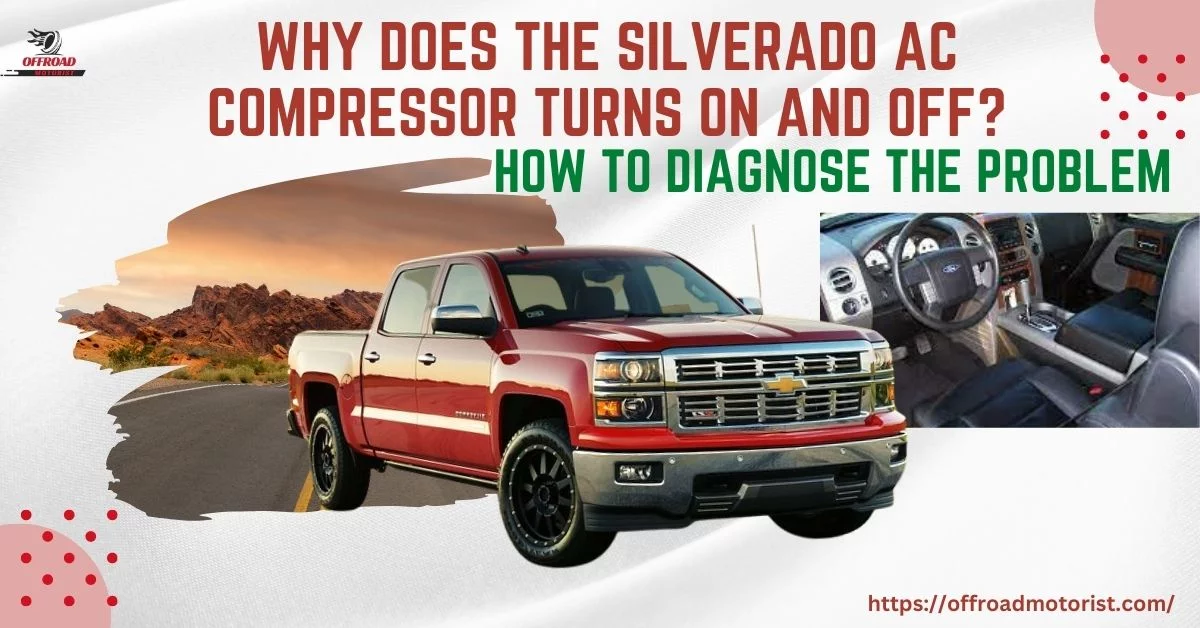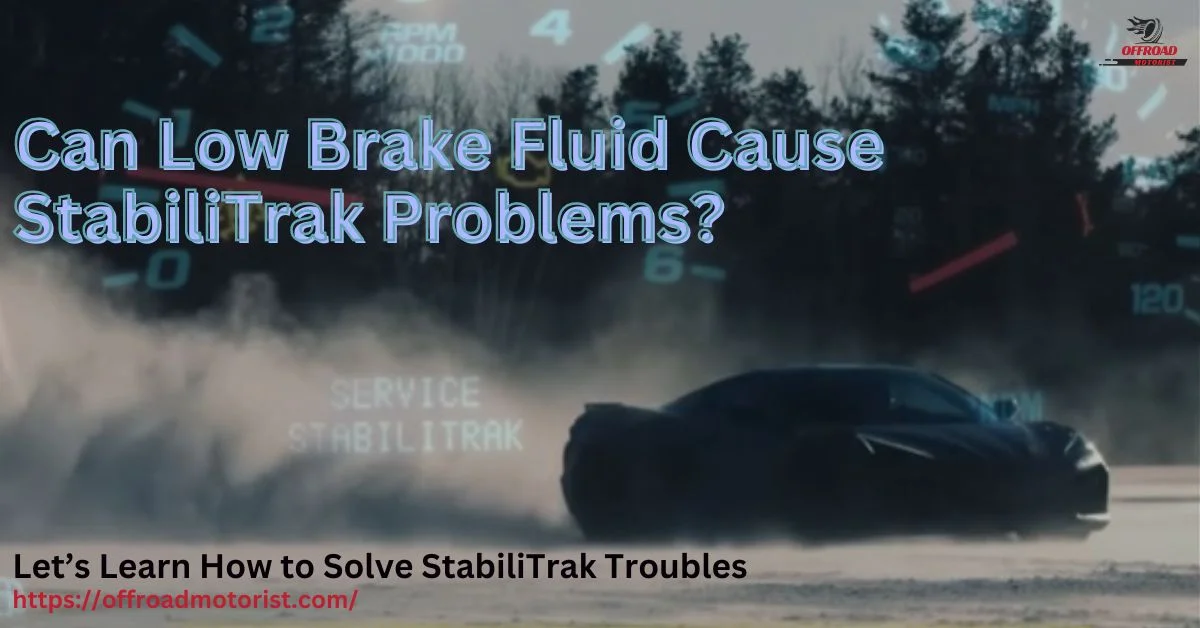Why Your Chevy Truck Randomly Shuts Off and How to Fix It
Experiencing your Chevy truck randomly shutting off can be both frustrating and concerning. This issue not only disrupts your driving experience but also poses a risk to your safety and the health of your vehicle.
This blog post aims to provide accurate information to help you identify potential causes and solutions for Why Your Chevy Truck Randomly Shuts Off and How to Fix It.
By understanding the reasons behind your truck’s sudden shutdown and the steps you can take to resolve it, you can ensure a smooth, reliable drive and prolong the lifespan of your Chevy.
Addressing this issue promptly is essential to avoid further complications and keep your truck running efficiently. So let’s dive into the deep.
Common Causes of Chevy Truck Randomly Shutts Off
Understanding the possible reasons behind your Chevy truck’s random shutdown is crucial for proper troubleshooting and resolution.
This section will explore some of the most common causes for this issue, categorized into three primary areas: electrical issues, fuel system problems, and engine sensors and management.
Remember that other factors may be at play, but these are the key areas to examine when experiencing this problem.
01. Electrical Issues
Electrical problems can often cause your Chevy truck to shut off unexpectedly. Here are two of the most common electrical issues to look for:
- Faulty ignition switch: The ignition switch sends power to your truck’s various electrical components. A worn or damaged ignition switch may intermittently lose contact, causing the engine to stall.
- Loose or corroded battery connections: Poor battery connections can result in inconsistent power supply to your truck’s electrical system, leading to sudden shutdowns. Corrosion or loose connections can interrupt the flow of electricity.
02. Fuel System Problems
Issues with your truck’s fuel system can also lead to random shutdowns. Below are two prevalent fuel system issues:
- Clogged fuel filter: Over time, debris and contaminants can clog your fuel filter, restricting fuel flow to the engine. This can cause your truck to stall or shut off unexpectedly.
- Failing fuel pump: A failing fuel pump may not provide adequate fuel pressure to the engine, leading to stalling or shutdowns. This issue can be intermittent and worsen over time.
03. Engine Sensors and Management
Lastly, problems with engine sensors and management can contribute to your Chevy truck randomly shutting off:
- Malfunctioning crankshaft position sensor: The crankshaft position sensor monitors the position and speed of the crankshaft, providing crucial data to the engine control module (ECM). A faulty sensor can send incorrect information, causing the engine to stall or shut off.
- Issues with the engine control module (ECM): The ECM controls various engine functions, such as fuel injection and ignition timing. A damaged or malfunctioning ECM can cause the engine to shut off unexpectedly.
Tips for Troubleshooting Why Your Chevy Truck Randomly Shuts Off
Before diving into potential repairs, it’s essential to accurately diagnose the root cause of your Chevy truck randomly shutting off.
In this section, we’ll outline some tips for effective troubleshooting that will help you pinpoint the issue and save you time and resources.
Keep in mind that some problems require the expertise of a professional mechanic, but these tips can serve as a starting point.
01. Performing a Visual Inspection
Begin by conducting a thorough visual inspection of your truck’s key components:
- Check the battery connections for signs of corrosion or looseness. Clean and tighten as needed.
- Examine the ignition switch, wiring, and related components for wear or damage.
- Inspect the fuel system for visible issues or leaks, including the fuel filter, fuel lines, and fuel pump.
02. Checking for Diagnostic Trouble Codes (DTCs)
Modern Chevy trucks have an On-Board Diagnostics (OBD) system that can store Diagnostic Trouble Codes (DTCs) when a problem occurs. Use an OBD-II scanner to check for any stored codes:
- Connect the scanner to the OBD-II port, usually located under the dashboard.
- Turn the ignition to the “ON” position, but don’t start the engine.
- Follow the scanner’s instructions to read and record any DTCs.
- These codes can help guide your troubleshooting process and indicate which systems or components may be responsible for the random shutdowns.
03. The Importance of Professional Diagnostics
If you’re unable to identify the issue through visual inspection or DTCs, it’s advisable to seek the help of a professional mechanic.
Professional mechanics possess the necessary tools, knowledge, and experience to perform more in-depth diagnostics and accurately pinpoint the problem.
Seeking help from a professional mechanic can save you time, money, and potential damage to your vehicle by addressing the issue correctly from the start.
How to Fix Chevy Truck Randomly Shuts Off
Once you’ve identified the root cause of your truck randomly shutting off, it’s time to address the issue.
In this section, we’ll provide detailed information on how to fix common problems related to electrical, fuel systems, and engine sensors and management.
Follow safety precautions and consult your vehicle’s service manual for specific instructions for your truck’s make and model. If you’re not confident in your abilities, seek the assistance of a professional mechanic.
01. Replacing a Faulty Ignition Switch
- Disconnect the negative battery cable to prevent any electrical issues.
- Remove the steering column covers by unscrewing or unclipping them.
- Locate the ignition switch, typically on the side of the steering column.
- Disconnect the electrical connector from the ignition switch.
- Remove any screws or bolts securing the ignition switch and carefully slide it off the column.
- Install the new ignition switch, align it with the column, and secure it with screws or bolts.
- Reconnect the electrical connector to the new ignition switch.
- Replace the steering column covers and reconnect the negative battery cable.
- Test the new ignition switch to ensure proper operation.
02. Cleaning or Replacing Battery Connections
- Disconnect the negative battery cable first, followed by the positive cable.
- If the battery terminals are corroded, mix baking soda and water. Apply the solution to the terminals and use a wire brush to clean off corrosion.
- Inspect the battery cables for damage or wear. Replace them if necessary.
- Reconnect the positive battery cable first, followed by the negative cable. Ensure the connections are tight and secure.
- Apply a thin layer of dielectric grease to the battery terminals to prevent future corrosion.
03. Addressing Fuel System Issues
1. Replacing a clogged fuel filter:
- Locate the fuel filter, typically along the fuel line underneath the vehicle or near the fuel tank.
- Relieve the fuel system pressure by removing the fuel pump fuse or relay and starting the engine until it stalls.
- Disconnect the fuel lines from the filter using a line wrench or quick-release tool.
- Remove the old fuel filter and replace it with a new one, ensuring proper flow direction.
- Reconnect the fuel lines and re-install the fuel pump fuse or relay.
- Start the engine and check for leaks.
2. Testing and replacing a failing fuel pump:
- Perform a fuel pressure test using a fuel pressure gauge. Consult your service manual for the correct pressure specifications.
- If the fuel pressure is below the specified range, locate the fuel pump, typically inside the fuel tank.
- Relieve the fuel system pressure and disconnect the negative battery cable.
- Drain and remove the fuel tank from the vehicle, following your service manual’s instructions.
- Remove the old fuel pump and install the new one, making sure to replace any required gaskets or seals.
- Reinstall the fuel tank and reconnect the negative battery cable.
- Refill the fuel tank and start the engine to check for proper operation and leaks.
04. Resolving Engine Sensor and Management Problems
1. Replacing a malfunctioning crankshaft position sensor:
- Locate the crankshaft position sensor, typically near the crankshaft pulley or flywheel.
- Disconnect the negative battery cable and unplug the sensor’s electrical connector.
- Remove any bolts or screws securing the sensor and carefully remove it from the engine.
- Install the new sensor and secure it with bolts or screws.
- Reconnect the electrical connector and the negative battery cable.
- Start the engine to ensure proper operation and check for any trouble codes.
2. Repairing or replacing the engine control module (ECM):
- Locate the ECM in the engine bay or under the dashboard.
- Disconnect the negative battery cable to prevent any electrical issues.
- Remove any covers or brackets securing the ECM and carefully unplug all electrical connectors.
- If you suspect a software issue, consult a professional mechanic or dealership to perform a software update or reprogramming.
- If the ECM requires replacement, install the new ECM and secure it with any covers or brackets.
- Reconnect all electrical connectors and the negative battery cable.
- A professional mechanic or dealership may need to reprogram the new ECM to your vehicle’s specific settings.
- Start the engine to ensure proper operation and check for any trouble codes.
Following these steps to address the most common causes of a Chevy truck randomly shutting off, you can effectively resolve the issue and restore your vehicle’s performance.
Note: Consult your service manual for specific instructions related to your make and model, and seek professional assistance if you are not confident in your abilities or if the issue persists.
Prevention Tips: Keeping Your Chevy Truck Running Smoothly
Preventing your Chevy truck from randomly shutting off is as important as fixing the issue when it arises.
Regular maintenance and attention to warning signs can help you avoid this frustrating problem and ensure a reliable and efficient driving experience.
Here are some prevention tips to keep your truck running smoothly:
01. Regular Maintenance and Inspections
- Follow your vehicle’s recommended maintenance schedule, as your owner’s manual outlines.
- Regularly check and replace fluids, such as engine oil, transmission fluid, and coolant.
- Inspect and replace worn components, such as spark plugs, ignition coils, and belts.
- Monitor the condition of the fuel system, including the fuel filter, fuel lines, and fuel pump.
- Perform regular battery checks, ensuring clean and tight connections.
02. Paying Attention to Warning Signs and Symptoms
- Keep an eye on your dashboard warning lights and address any issues immediately.
- Listen for unusual noises or changes in your truck’s performance, such as hesitations, misfires, or stalling.
- Take note of any decrease in fuel efficiency or unusual smells, which could indicate a problem with the fuel system or engine management.
03. Staying Informed About Common Issues With Your Specific Chevy Truck Model
- Research common problems and recalls related to your truck’s make, model, and year.
- Join online forums or communities where other Chevy truck owners share their experiences and knowledge.
- Consult a trusted mechanic familiar with your truck model to stay informed about potential issues and maintenance tips.
By implementing these prevention measures, you can minimize the risk of your Chevy truck randomly shutting off and maintain a safe and reliable vehicle for years.
FAQs About Chevy Trucks Randomly Shutting Off
In this section, we’ll address some frequently asked questions about Chevy trucks randomly shutting off. These questions cover additional aspects that may not have been discussed in detail earlier in the blog post.
Can a bad alternator cause my Chevy truck to shut off randomly?
The alternator is responsible for charging the battery and supplying power to the electrical system when the engine runs. If the alternator is not providing sufficient power, the battery may be unable to maintain the electrical system, causing the engine to stall.
How can I tell if the problem is due to a bad battery or alternator?
Symptoms of a failing fuel pump include poor acceleration, decreased fuel efficiency, and engine stalling. Perform a fuel pressure test to confirm the issue.
What if my Chevy truck shuts off while driving but restarts after a few minutes?
This may be due to a faulty ignition switch, crankshaft position sensor, or fuel pump. Diagnose the problem and address the specific cause to resolve the issue.
Can a dirty or failing mass air flow (MAF) sensor cause my truck to shut off randomly?
A dirty or malfunctioning MAF sensor can cause various issues, including stalling, hesitation, and poor engine performance. The MAF sensor measures the air entering the engine, allowing the ECM to calculate the proper fuel mixture. Cleaning or replacing the MAF sensor may resolve the random shutdown issue.
Can a vacuum leak cause my truck to shut off randomly?
A vacuum leak can cause rough idling, stalling, and poor engine performance, disrupting the air-fuel mixture. Detect leaks using a smoke machine or by listening to hissing sounds.
Can a bad camshaft position sensor cause random shutdowns?
A faulty camshaft position sensor can cause stalling, misfires, and rough running. The sensor helps the ECM control ignition timing and fuel injection.
How do I know if my ignition coil is bad?
Symptoms of a bad ignition coil include misfires, poor fuel economy, and reduced power. Use an ignition coil tester or multimeter to check for proper resistance and voltage.
Can a dirty throttle body cause my truck to shut off randomly?
A dirty throttle body can cause stalling, rough idling, and poor acceleration. Cleaning the throttle body with a specialized cleaner can resolve these issues.
Can a failing transmission cause my truck to shut off randomly?
While uncommon, a severely failing transmission can cause stalling or shutdowns. Symptoms likely include slipping gears, delayed shifting, and grinding noises.
Can a bad oxygen sensor cause my truck to shut off randomly?
A faulty oxygen sensor can lead to poor engine performance, reduced fuel efficiency, and a check engine light. It’s less likely to cause random shutdowns but can still affect overall performance.
Final Thoughts
Dealing with a Chevy truck that randomly shuts off can be frustrating and dangerous. Identifying and addressing the root cause is crucial for maintaining a safe and reliable vehicle.
Common issues include electrical problems, fuel system malfunctions, and engine sensor or management failures.
By performing regular maintenance, paying attention to warning signs, and staying informed about common issues specific to your truck model, you can prevent this problem and ensure a smooth driving experience.
Consider your service manual for guidance, and seek professional help if you’re unsure about any repair procedures or if the issue persists.
Fix the Chevy truck randomly shuts off issue with our comprehensive guide. Learn about common causes, troubleshooting tips, and prevention measures for a smooth drive.

![Chevy Transfer Case Interchange Chart [Everything you need to Know] chevy transfer case interchange chart](https://offroadmotorist.com/wp-content/uploads/2023/03/chevy-transfer-case-interchange-chart-150x150.jpg)

![Mysterious Shutdowns: Chevy Silverado Shuts Off While Driving and Won't Start [Issue Fixed] Chevy Silverado Shuts Off While Driving and Won't Start](https://offroadmotorist.com/wp-content/uploads/2023/02/chevy-silverado-shuts-off-while-driving-150x150.jpg)
![Mastering Headlights| Low Beam vs High Beam [Symbols, Functions, and Optimal Usage] Low Beam vs High Beam](https://offroadmotorist.com/wp-content/uploads/2023/03/Low-Beam-vs-High-Beam-150x150.jpg)
![Normal Transmission Temperature Silverado 1500 [Every Thing You Need to Know] Normal Transmission Temperature Silverado 1500](https://offroadmotorist.com/wp-content/uploads/2023/03/Normal-Transmission-Temperature-Silverado-1500-150x150.jpg)




![Chevy Truck Hesitates When Accelerating [Causes and Solutions]](https://offroadmotorist.com/wp-content/uploads/2023/03/chevy-truck-hesitates-when-accelerating.jpg)

